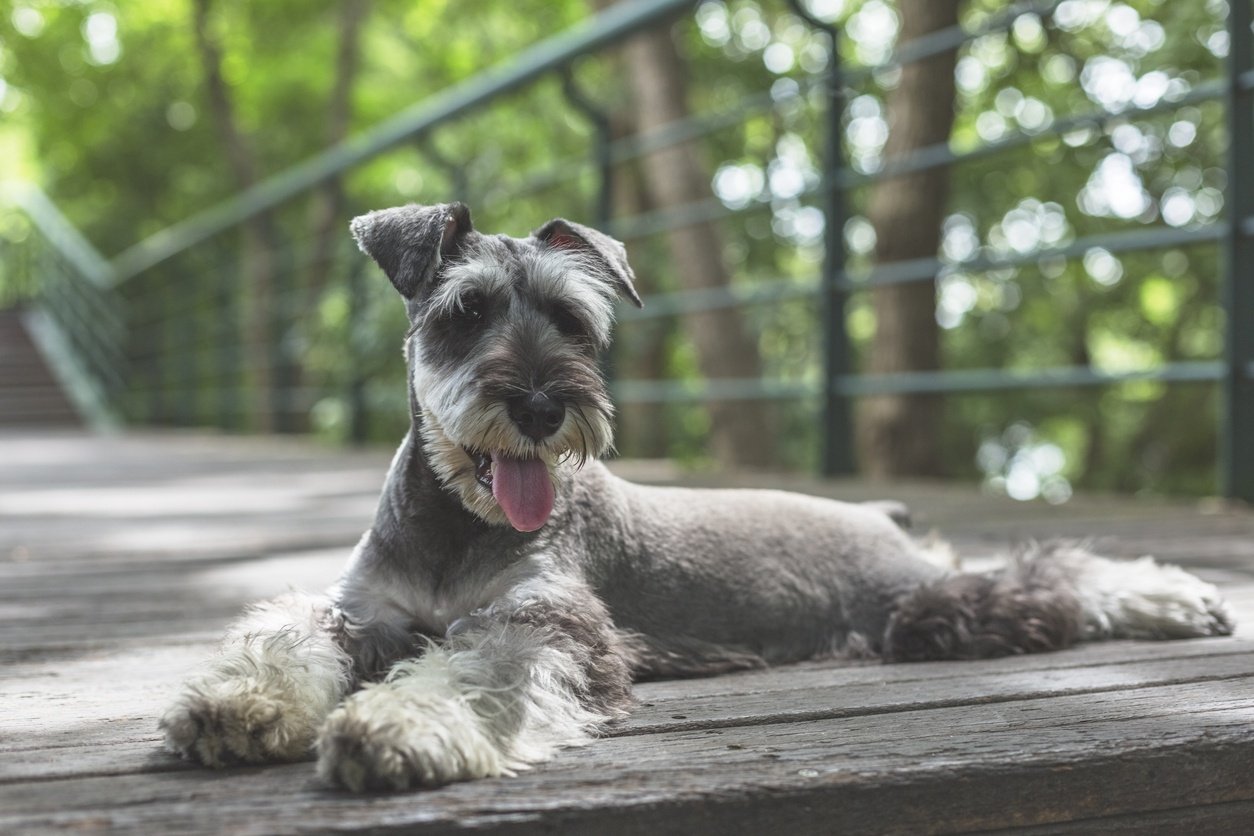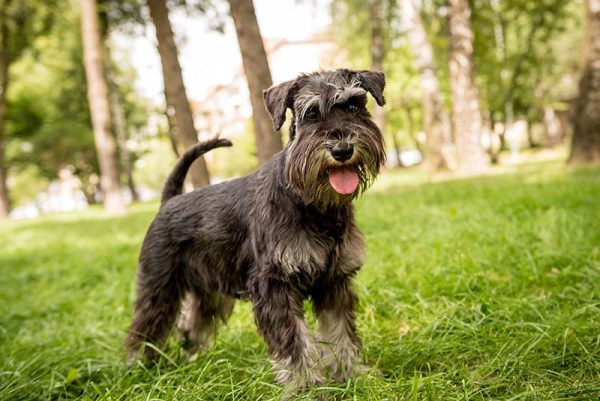Use English language, and raw data
The Miniature schnauzer, with its charmingly scruffy beard and intelligent, playful eyes, has captured hearts worldwide. These small, powerful dogs are known for their loyalty, energy, and versatility, making them excellent additions to families of all sizes and lifestyles. However, like all living creatures, Miniature Schnauzers have a finite lifespan. Understanding their average lifespan, factors that influence it, and how to ensure a long and healthy life for your furry friend is key to maximizing the joy they bring.
Factors Affecting Mini Schnauzer Longevity

While the average lifespan for a Miniature Schnauzer is 12 to 15 years, there are several factors that can influence this. It’s important for owners to be aware of these factors in order to provide the best care for their beloved pets.
Genetics
Genetics play a significant role in a dog’s lifespan, and Miniature Schnauzers are no exception. Good breeding practices are crucial for a long and healthy life. Reputable breeders will screen their dogs for genetic predispositions to diseases, ensuring that their offspring are healthier and have a higher chance of living longer.
Some common health issues that can affect Miniature Schnauzers include pancreatitis, liver shunts, and bladder stones. Responsible breeders will conduct health tests on their dogs to identify any potential genetic disorders and avoid breeding dogs that carry these traits. This not only improves the overall health of the breed but also increases the lifespan of Miniature Schnauzers.
Nutrition
Proper nutrition is essential for any dog’s health and can greatly impact their lifespan. For Miniature Schnauzers, a balanced and complete diet tailored to their specific needs is crucial. Overfeeding, poor-quality food, or a lack of essential nutrients can lead to health issues that can shorten their lifespan.
When choosing food for your Miniature Schnauzer, opt for high-quality, breed-specific formulas that are free from fillers and by-products. It’s also important to follow feeding guidelines and not overfeed your dog, as obesity can lead to a host of health issues such as joint problems, heart disease, and diabetes.
Exercise and Mental Stimulation
In addition to proper nutrition, regular exercise and mental stimulation are key factors in maintaining a Miniature Schnauzer’s overall health and longevity. These active and intelligent dogs thrive on daily walks, playtime, and training sessions.
Regular exercise not only helps to maintain a healthy weight but also promotes good cardiovascular health, strengthens muscles and joints, and provides mental stimulation. Mental stimulation is just as important for Miniature Schnauzers as physical exercise, as they are highly intelligent and need to be mentally engaged to stay happy and healthy.
Maintaining a Healthy Lifespan for Your Mini Schnauzer

As responsible pet owners, we all want our furry friends to live long and healthy lives. By understanding the factors that influence a Miniature Schnauzer’s lifespan, we can take steps to ensure that our beloved companions have the best chance at a long and fulfilling life.
Regular Veterinary Care
Regular check-ups with a trusted veterinarian are essential for maintaining your Miniature Schnauzer’s health. Annual exams, vaccinations, and routine blood work can help identify any potential health issues early on, allowing for prompt treatment and potentially extending your dog’s lifespan.
Additionally, as Miniature Schnauzers age, more frequent visits to the vet may be necessary to monitor any chronic conditions and adjust their care accordingly. Regular dental cleanings are also crucial for preventing dental disease, which can lead to other health issues and impact your dog’s lifespan.
Proper Dental Care
Dental care is often overlooked but is crucial for a dog’s overall health and can impact their lifespan. Miniature Schnauzers are prone to dental issues, so it’s important to establish a dental care routine early on and stick to it.
Regular teeth brushing and providing appropriate chew toys can help keep your Miniature Schnauzer’s teeth clean and healthy. Additionally, incorporating dental treats into their diet can also aid in maintaining good oral health. If left untreated, dental disease can lead to more serious health issues such as heart and kidney disease, shortening your dog’s lifespan.
Grooming
Proper grooming is not only important for a Miniature Schnauzer’s appearance but also for their health and well-being. Their thick, wiry coat requires regular brushing and trimming to prevent matting and skin issues. Be sure to check their ears regularly for any signs of infection and trim their nails as needed to avoid discomfort and potential injuries.
Regular grooming sessions also provide an opportunity to check for any lumps, bumps, or other abnormalities on your dog’s body. Early detection of any health issues can greatly impact their treatment and overall lifespan.
Signs of Aging in Mini Schnauzers

As Miniature Schnauzers approach their senior years, it’s important for owners to be aware of the signs of aging to ensure their pet receives appropriate care. Some common signs of aging in Miniature Schnauzers include:
- Decreased activity levels
- Changes in appetite or weight
- Changes in sleeping patterns
- Stiffness or difficulty with movement
- Poor grooming habits
- Increased frequency of accidents or difficulty controlling bladder/bowels
- Changes in behavior or temperament
- Vision or hearing loss
If you notice any of these signs in your Miniature Schnauzer, it’s important to consult with your veterinarian to rule out any underlying health issues and make necessary adjustments to their care.
Senior Care for Mini Schnauzers

As dogs age, their needs and abilities change, and this is no different for Miniature Schnauzers. Adjusting their care and routine to accommodate these changes can greatly impact their quality of life and potentially extend their lifespan.
Diet and Exercise
Senior Miniature Schnauzers may require a change in diet to accommodate their changing nutritional needs. It’s important to consult with your veterinarian about the best food options for your aging dog, as they may have specific dietary requirements due to health issues or decreased activity levels.
Exercise should also be adjusted to suit your senior Miniature Schnauzer’s abilities. While regular walks are still beneficial, they may not be able to go on as long or as vigorous as before. Providing mental stimulation through puzzle toys or short training sessions can also help keep their minds sharp and active.
Comfort and Mobility
As Miniature Schnauzers age, they may develop joint issues such as arthritis, which can impact their mobility and comfort. Providing comfortable bedding and ramps or stairs for them to access furniture or vehicles can ease any discomfort and prevent potential injuries.
Additionally, providing supplements such as glucosamine and chondroitin can help improve joint health and alleviate symptoms of arthritis. Consult with your veterinarian before starting any new supplements or medications for your senior Miniature Schnauzer.
Regular Check-ups and Monitoring
Regular check-ups with a veterinarian become even more important for senior Miniature Schnauzers. These visits allow for monitoring of any chronic conditions and making adjustments to their care accordingly. Your vet may also recommend additional screenings or tests to catch any health issues early on.
Understanding the End of Life for Mini Schnauzers

As difficult as it may be to face, at some point, all living creatures reach the end of their lifespan. As pet owners, it’s important to understand the signs of aging and what to expect as our beloved Miniature Schnauzers near the end of their lives.
Hospice Care
Hospice care for pets, also known as palliative care, is a service that provides comfort and support to terminally ill animals and their owners. This type of care focuses on keeping the animal comfortable and pain-free during their final days.
If your Miniature Schnauzer has been diagnosed with a terminal illness, hospice care can greatly improve their quality of life and allow them to spend their remaining time surrounded by love and comfort.
Euthanasia
Euthanasia is a difficult but often necessary decision for pet owners when their beloved companion’s quality of life has significantly declined due to old age or illness. While it’s never an easy choice, it’s important to consult with your veterinarian and make the decision that is best for your Miniature Schnauzer.
If you do choose euthanasia for your pet, know that they will be peacefully put to rest without any suffering, surrounded by those who love them.
Conclusion
Miniature Schnauzers are wonderful companions that bring joy and love into our lives. As responsible pet owners, it’s our duty to understand their average lifespan, factors that influence it, and how to provide the best care possible to ensure a long and healthy life for our furry friends.
By following proper breeding practices, providing a balanced and nutritious diet, regular exercise and mental stimulation, and proper grooming and healthcare, we can help extend the lifespan of our Miniature Schnauzers. And as they enter their senior years, adjusting their care and being aware of signs of aging can further improve their quality of life.
While it’s never easy to say goodbye, understanding the end of life process for our Miniature Schnauzers and providing hospice care or making the difficult decision of euthanasia can ensure that they leave this world surrounded by love and without suffering.
So cherish every moment with your Miniature Schnauzer and give them the best life possible, for they truly are lifelong companions that deserve all the love and care in the world.
